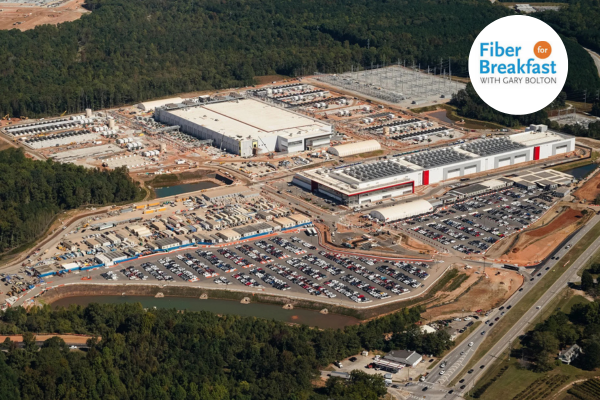FFB Week 38: Building Broadband Ecosystems for Growth
FFB Week 38: Building Broadband Ecosystems for Growth
This week’s Fiber for Breakfast featured Greg Wilson, CEO of Ripple Fiber, who shared how his company is building an ecosystem designed to fuel long-term growth and market resilience. Ripple Fiber may be just four years old, but the company is already carving out a strong position in the competitive broadband landscape. Founded in 2021 and headquartered in Charlotte, North Carolina, Ripple has grown quickly by pairing entrepreneurial grit with a strategic focus on mergers, acquisitions, and partnerships.
Wilson’s path to Charlotte began in South Africa, where he built businesses in data centers, middle-mile network, and cloud services long before “cloud” became a mainstream term. His early ventures in fiber to the home emerged almost by accident — initially to support neighborhood security cameras — but quickly revealed the potential for residential broadband. As demand surged, Wilson and his partners created platforms and processes to scale from dozens of installs to tens of thousands each month Their experience in open access markets, where dozens of providers shared infrastructure, required a high degree of automation and efficiency. Those lessons became core to Ripple’s playbook.
Wison’s arrival in the U.S. market came with immediate challenges. Within weeks of turning up Ripple’s first network south of Charlotte competitors Google Fiber and Windstream overbuilt the same area. Rather than retreat, Wilson doubled down, convinced that fiber’s performance advantages over cable would win customers. “Fiber is a far better technology,” Wilson said. “Any person that applies common logic has to get to the decision that fiber is going to outperform cable – it’s just a matter of time.” Ripple’s model aims for breakeven at around 20-25% penetration, with strong profitability above 40%. While competition is fierce and established providers are aggressive with discounts and promotions, Wilson emphasized that fiber’s reliability, speed, and latency are advantages that hold steady over time
Ripple’s ecosystem approach extends beyond infrastructure. The company has built proprietary tools to identify and evaluate expansion markets, layering industry datasets with its own analytics. Sophisticated algorithms allow Ripple to model densities, costs, and take-rate assumptions in real-time, helping the team pivot as quickly as competitive conditions change. Wilson noted that while the original plan was to expand concentrically from Charlotte, the data pointed to opportunities in multiple states, and Ripple has since established a presence in eight markets.
Operating in the U.S. presents different challenges than in South Africa but Wilson said the key to success in both regions is empowering local teams to solve problems on the ground. Leveraging offshore engineering and service desk support has helped Ripple scale efficiently, while lessons learned and smaller, harder to reach communities abroad have given the company a head start and managing niche rollouts in the US.
Ripples portfolio today offers 500 Mbps, 1 Gbps, and 2 Gbps service tiers, with most customers opting for the higher speeds. Wilson said uptake has exceeded expectations, reflecting growing household demand for bandwidth-hungry applications. “we’ve been really surprised in terms of people’s appetite for speed – the majority of our uptake is on the gig and higher packages.” Looking ahead, Ripple plans to roll out new packages aligned with emerging Wi-Fi standards, ensuring customers get the full benefit of their fiber connections.
For Wilson, building Ripple is not just about networks, but about community and collaboration. His company’s annual Myriad Mountain Masters cycling event in South Africa brings together clients, financiers, and suppliers for a multi-day mountain biking adventure — embodying the spirit of partnership that underpins their strategy. As Wilson put it, the company’s success depends on creating an ecosystem where infrastructure, software, talent, and capital all move together towards the same goal: delivering fast, reliable fiber broadband to millions of homes.
Click here to listen to the full episode or find previous episodes of Fiber for Breakfast.




